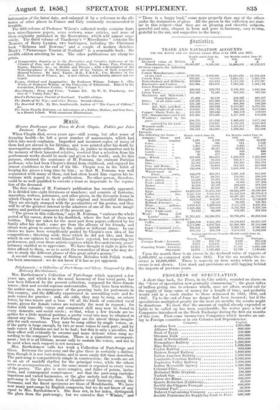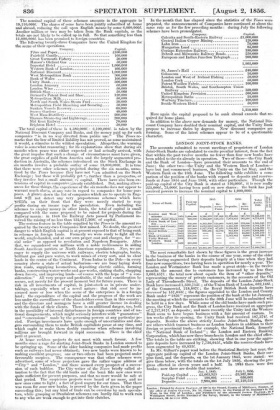PROGRESS OF SPECULATION.
A short time back, the Times, in its City article, sounded an alarm on the "fever of speculation now gradually commencing" ; the great influx of bullion giving rise to schemes which, once set afloat, would call for the supply of large sums of money for a length of time, and probably would end in a crash similar to those witnessed in 1825, 1836, and 1847. Up to the end of June no danger had been incurred ; but if the speculations multiplied greatly for the next six months the results might be disastrous. To show that the amount of capital already expended or liable to be called up has been considerable' the writer gave a list of Companies introduced on the Stock Exchange during the first six months of this year. First come twenty-two Companies which involve an out- lay in Foreign countries or in our Colonies and Dependencies.
Company. Capital.
Acadian Iron 4:200,000 Alliance Bank 800,000 Bank of Egypt 250,000 Ottoman Bank 500,000 Bank of Switzerland 800,000 Pernambuco Railway 1,200,000 Riga Railway 1,600,000 Ceylon Railway 800,000 Eastern Bengal Railway 1,000,000 Italian Junction Railway 1,000,000 Lombardo-Venetian Railway 6,000,000 Euphrates Valley Railway 1,000,000 Indian Mercantile Agency 1,000,000 Colonial Fibre 100,000 liultsdorf Mills (Ceylon) 100,000 Turkish Gas 100,000 Caisse des Mines 800,000 Quartz Reduction (California) 50,000 Sochlte des Clippers Francais 800,000 Trinidad Fuel • 50,000 Ruhrort Coal-mining Company 160,000 Societe' Parisienne for Supplying Coals to Paris 800,000
The nominal capital of these schemes amounts in the aggregate to 19,110,000/. The shares of some have-been jointly subscribed at home and abroad, reducing the call upon English means by some 6,000,000/. Another millien or two may be taken from the Bank capitals, as the totals are not likely to be called up in full. So that something loss than 11,000,0001. has been promised to foreign countries.
The following twenty-three Companies have the United Kingdom for the scene of their operations. '
Company. Capital.
Fibre and Paper £100,000 Fairfield Candle 160,000 Great Yarmouth Fishery 30,000 Hansor's Olefiant Gas 50,000 Imperial Hotel 1,000,000 Western Bank of London 400,000 National Discount 1, 000,000 West Metropolitan Bank 300,000 Bank of Wales. 100,000 Unity Bank 300,000 London Armoury 60,000 London Wine ' 50,000 British Slag 50,000 Bernard's Patent Boot and Shoe 120,000 Metropolitan Milk 50,000 North and South Wales Steam Fuel 30,000 Metropolitan Field Bleaching and Scouring 30,000 Sunken Vessels Recovery 60,000 Surrey Gardens 40,000 West Ham Distillery 200,000 Thames Steam-tug and Lighterage 200,000 Mid Kent Railway 70,000 Brighton Hotel 50,000
The total capital of these is 4,380,000!.: 2,100,000/. is taken by the National Discount Company and Banks, and the money paid up for such companies "is in no way diverted from public use." The Times re- marks that the law of limited liability has not proved, as some maintained it would, a stimulus to the wildest speculation. Altogether, the warning voice is somewhat reassuring ; for its explanations show that during six months when peace was either expected or had actually arrived, with the great impulse that such a change of circumstances must have given, the great supplies of gold from America and the largely augmented pro- duction in Australia, the schemes introduced on the Stock Exchange in six months involve a probable outlay of some 13,000,000/. It is true that there were other schemes projected during the six months, =no- ticed by the Times because they have not en admitted on the Stock Exchange ; but these will probably get '1,-, further than a prospectus, or they involve but a small amount ef capital. There have also been ex- tensions of capital in companiee aiready established. But, making allow- ances for these things; the experience of the six months does not appear to warrant much alarin, at any rate in regard to companies for home pur- poses. A giallo:: down the list of companies which are to operate in Eng- land will not detect any very preposterous schemes which have vitteli on their front that they were merely started to reap /profits during an insane rage for speculation. Even including the schemes to employ money in other lands, the total of capital is small compared with the sums proposed to be raised for projects during the Railway mania : in 1846 the Railway Acts passed by Parliament in- volved the raising of no less than 132,617,368/. of capital.
The serious feature in the table supplied by the Times is the amount re- quired by the twenty-two Companies first named. No doubt, the greatest danger to which English capital is at present exposed is that of being sunk in schemes in foreign lands. Formerly we were ready to fight all the world, single-handed, and at our own proper cost and charges, for "so- cial order" as opposed to revolution and Napoleon Bonaparte. After that, we squandered our millions with a noble recklessness in aiding South American patriots or North American repudiators. Now, we are eager to supply the universe with, railways, electric telegraphs, banks, brilliant gas and pure water, to work mines of every sort, and to clear lands in the centre of the Continent. From Indus to the Pole-in every country above a state of actual barbarism-we are busy laying down iron roads, supplying locomotives, depositing electric cables, forming banks, constructing water-works and gas-works, sinking shafts, chopping down forests, and improving lands-of course with the hope of "a con- sideration." All very proper and profitable, if the said consideration be secure, not merely for the present moment but for future years. There is risk in all investments of capital, in joint-stock as in private under- takings, especially when of a novel nature : that risk must be in- creased more or less when the scene of the enterprises is in a foreign land ; the expenditure of the capital and the progress of the work are less under the surveillance of the shareholders even than in this country ; and the directors and managers have a still greater licence in dealing with the funds of their clients. There is an additional danger, too, both in the possibility of internal disturbances in foreign countries and of na- tional disagreements, which might seriously interfere with "guarantees" and "concessions" made by the governing powers at any particular pe- riod. Foreign investments have quite enough of uncertainties and dan- gers surrounding them to make British capitalists pause at any time, and which ought to make them doubly cautious when schemes involving millions are brought forward in rapid succession. There is the chief peril at present. At home reckless projects do not meet with much favour. A few months since a rage for starting Joint-Stock Banks in London seemed to be springing up. Some of the older banking companies had made profits such as railways had never obtained ; two new banks were known to be making excellent progress; one or two others had been projected under favourable auspices. The consequence was that other schemes were advertised, some of whose projectors gave the rather vague address of " City " and "London," and there seemed every prospect of a succes- sion of such bubbles. The City writer of the Times briefly called at- tention to the fact that the old banks and the bona fide new ones were quite sufftcient for present purposes, and that no more would be safe at that period. The suspicious projects were heard of no more, and no new ones came to light ; a fact of good augury for our times. That there was room for some new banks, is proved by the facts given in the paper succeeding this; but any kind of trade can be overdone by rash specula- tors, while grasping or ffaudulent schemers can hardly fail to work ruin to any who are weak enough to get into their clutches. In the month that luis elapsed since the statistics of the TiMe8 were prepared, the announcements of Companies have continued at about the same rate as for the few preceding months : during July the following schemes have been promulgated.
Company. Capital.
Calcutta and South-Eastern Railway £1,000,000 Central Italian Copper Mining 120,000 Lahn Iron 70,000 Hungarian Land 85,000 Copiapo Extension Railway. 180,000 Detroit and Milwaukie Railway Bonds. 250,000 European and Indian Junction Telegraph 200,000 1,905,000 St. James's Hall £40,000 Colosseum 10,000 London and West of Ireland Fishing 50,000 London Cork 50,000 Patent Woollen Fabric 100,000 Bristol, South Wales, and Southampton Union Railway 300,000 United Kingdom Provision 500,000 Metropolitan Baths 10,000 Warburg Tincture 100,000 South-Western Hotel 50,000 1,210,000 Here again the capital proposed to be sunk abroad exceeds that re- quired for home plans. In addition to the above new demands for money, the National Dis- count Company have doubled their nominal capital, and the Unity Bank propose to increase theirs by degrees. New discount companies are forming. Some of the latest schemes appear to be of a questionable character.



































 Previous page
Previous page